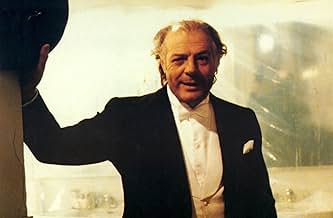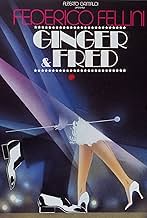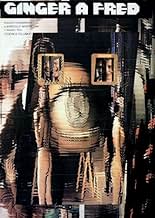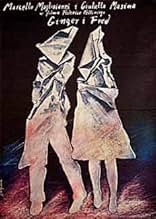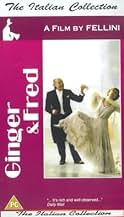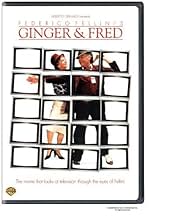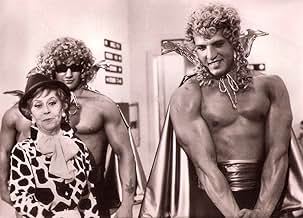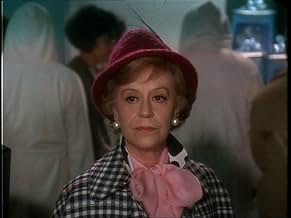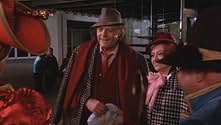ÉVALUATION IMDb
7,2/10
5,8 k
MA NOTE
Amelia et Pippo sont réunis après des dizaines d'années pour interpréter leur ancien numéro de music-hall dans une émission de télévision.Amelia et Pippo sont réunis après des dizaines d'années pour interpréter leur ancien numéro de music-hall dans une émission de télévision.Amelia et Pippo sont réunis après des dizaines d'années pour interpréter leur ancien numéro de music-hall dans une émission de télévision.
- Nominé pour le prix 1 BAFTA Award
- 18 victoires et 18 nominations au total
Friedrich von Ledebur
- Admiral Aulenti
- (as Frederick Ledebur)
Jacques Henri Lartigue
- Brother Gerolamo
- (as Jacques Henry Lartigue)
Totò Mignone
- Totò
- (as Toto Mignone)
Antoine Saint-John
- Bandaged man
- (as Antoine Saint Jean)
Friedrich von Thun
- Kidnapped Industrialist
- (as Frederich Thun)
Antonino Iuorio
- Production Inspector
- (as Antonio Iuorio)
Avis en vedette
I think this is the last great Federico Fellini picture. Maybe it's not as classic as "I vitelloni", "La strada", "Le notti di Cabiria", "La dolce vita", "Otto e mezzo" and "Amarcord", but it's a return to a more comedy style and it's one of the most accessible works of the Maestro as well.
"Ginger e Fred" (1985) comes after a series of more experimental films from Fellini. In this satirical comedy about TV power, a couple of old dancers reunite for a Christmas show. They enter a world where everything is taken for making audience, the two and their art are just caricatures... But who cares? The only important thing is audience.
In this feature Fellini warns about TV dangers -in a very sarcastic way he anticipates what TV is today with all these Reality shows.
The film is a typical Fellini picture -the story has not a real plot, it's a voyage where strange people (also in a physical way!) meet, we always can find exaggerated and ambiguous situations...
At the same time there's a lot of tenderness between the two dancers, superbly played by Marcello Mastroianni (who starred in several Fellini works) and Giulietta Masina (the actual Fellini's wife). It's useless to say that the chemistry between the two main actors is rally great.
It's quite a nostalgic movie -it seems that Fellini looks back and thinks about a world in which fantasy and creativity could be expressed in a better way, whereas TV kills everything.
The two subsequent films of the Italian director ("Intervista" and "La voce della luna") are rather minor -although poetic they're not as fresh and simple as "Ginger e Fred".
We miss Federico, Giulietta and Marcello.
"Ginger e Fred" (1985) comes after a series of more experimental films from Fellini. In this satirical comedy about TV power, a couple of old dancers reunite for a Christmas show. They enter a world where everything is taken for making audience, the two and their art are just caricatures... But who cares? The only important thing is audience.
In this feature Fellini warns about TV dangers -in a very sarcastic way he anticipates what TV is today with all these Reality shows.
The film is a typical Fellini picture -the story has not a real plot, it's a voyage where strange people (also in a physical way!) meet, we always can find exaggerated and ambiguous situations...
At the same time there's a lot of tenderness between the two dancers, superbly played by Marcello Mastroianni (who starred in several Fellini works) and Giulietta Masina (the actual Fellini's wife). It's useless to say that the chemistry between the two main actors is rally great.
It's quite a nostalgic movie -it seems that Fellini looks back and thinks about a world in which fantasy and creativity could be expressed in a better way, whereas TV kills everything.
The two subsequent films of the Italian director ("Intervista" and "La voce della luna") are rather minor -although poetic they're not as fresh and simple as "Ginger e Fred".
We miss Federico, Giulietta and Marcello.
10cwitt
Ginger e Fred is much more a film about the Italian psyche than a film about an old dance team that reunites after 40 years to appear on a TV variety show. It takes place at Christmastime, and having spent Christmas in Rome, the fun-insane carnival atmosphere Fellini depicts is pretty accurate, but exaggerated for film. Walking around Rome I found subconscious playing back bits of the soundtrack and it was only then that I realized how much I love this film. It's also about people who time leave behind. And about two people who are tragically unable to say how much they do love each other. It's also very very funny. Fellini go the idea for the film after seeing his older films butchered on Italian TV. A highlight is an old woman who was paid not to watch TV for a month. She's brought into the studio a mental wreck, swearing she'll never do it again and promises to watch more and more TV.
10jhclues
Memories are time capsules kept within every one of us, stored in the mind, but activated by the heart; the indelible images and sensations that make up an individual's life. A heartbeat away, they can be opened at any time, but let the bearer beware, for often they are bittersweet at best. `Ginger and Fred,' directed by Federico Fellini, and starring Giulietta Masina and Marcello Mastroianni, brings two people back together after nearly thirty years apart, a reunion of the professional dance team who for fifteen years prior to their retirement imitated Ginger Rogers and Fred Astaire to the delight of audiences all over Europe. Now, all these years later, they are to dance together again; this time on the popular television show, `We Are Proud To Present,' a `tabloid' type show which presents a variety of acts and guests weekly for the perusal of their curious audience. And so, amid a circus atmosphere of acts comprised of a troop of midgets, an Admiral, a number of celebrity impersonators and those whose personal lives have attracted media attention, Amelia Bonetti/'Ginger' (Masina) and Pippo Botticella/'Fred' (Mastroianni), come together again for one magical night during which they hope to recapture that spark of life they had embraced those many years ago. At it's core, Fellini's film is heart-felt and poignant. On one hand, it's a satire of popular television; on the other, it's an examination of the very real ramifications of those so-called `sentimental journeys' that those of a certain age are wont to take, and during which it is often discovered that it is, indeed, impossible to go home again. What really makes this film work is the stoic attitudes of the principal characters, especially Ginger, who though she is happy to see Pippo again refuses to allow sentiment to engulf her. Obviously, her memories are fond ones, but she manages to stay in the here and now, taking life as it is and not merely basking in what it was. Pippo, though, has a bit more of the wanton dreamer in him, possibly due to the fact that his life since the split with Amelia has not been as directionally grounded as that of his former partner. But as showtime approaches, they manage to strike a balance between the past and now that keeps them on track and holds much promise for an evening of making new memories to add to the old. Besides the story itself, what makes this film a real treasure is the presence and performance of the indomitable Giulietta Masina. In her mid-sixties when this was filmed, she still had `it' in spades. All the moves, the attitude, the coquettishness that made her one of the most expressive actresses ever. Even in her advancing years she was still an absolute joy to behold. There was something so down-to-earth, yet almost mystical about her, that gave her that rare quality of being `real' in every role she played. Extremely talented and charismatic, she was quite simply an extraordinary actress. Somehow-- and it's quite puzzling-- she never achieved the international stardom nor received the acclaim she deserved. This film proved to be her theatrical swan song, and simply put, what a way to go. She bowed out as she had always lived her life and performed-- with style, grace and more than a touch of class. Her `Ginger' is a truly memorable character. Not to be outdone by his diminutive co-star, Mastroianni gives a wonderful performance as well, capturing the essence of a man whose life has apparently been in one continuous state of flux. As the story unfolds, you get the feeling that his aloofness merely masks a somewhat undisciplined determination, probably more often than not derailed by the boy still residing in the man. Most importantly, though, he makes Pippo entirely believable, and the fact that he is so good in this film reflects, I believe, not only upon his ability as an actor, but upon the fact that Masina was so giving as an actress. It is apparent in the way they play so well off of one another, and the real chemistry between them is unmistakable. The supporting cast includes Frederick Ledebur (Admiral), Friedrich von Thun (Industrieller), Francesco Casale (Mafioso) and France Fabrizi (Show Host). One of Fellini's tenderest films, `Ginger and Fred' is something of a reflection upon life and love; watching it is like reminiscing with, or about, an old friend or loved one. The film has something of a dream-like quality about it that is so in keeping with Fellini's visionary style, and by the end you will find that you have been absolutely transported. Still, of all the wondrous images brought to the screen by Fellini during the many years of his career, the greatest of all was irrefutably Giulietta Masina. I rate this one 10/10.
Before I saw this movie, I had heard how it was considered one of Federico Fellini's more accessible movies. If this was meant of Fellini's films from the sixties on, I can agree with that. The film is basically two things: one big jab at television and giving Giuletta Masina the opportunity to show everyone how adorable she is (she succeeds). The TV angle, however scathing it may have been in 1986; today with the plethora of reality TV shows, the film just seems prescient. The film's very basic storyline is Masina reuniting with old dance partner Marcello Mastroianni for a TV show. Filling in the rest of the movie (and sometimes obscuring the main story) are the many oddball characters scheduled for the TV show. As anyone familiar with Fellini knows, he loves outrageous people. In this film, for example, there are transsexuals, psychics, a midget troupe and a cow with many teats. The first part of the movie, at the hotel, is a little too much because everything is thrown at the viewer at once. The characters, television, Ginger and Fred, all vie for your attention and it can be overwhelming. Once at the studio, the film kind of settles down and one is able to enjoy the film and it's characters. Not one of Fellini's best but also not only for fanatics of Fellini either.
Ginger e Fred (1986) is one of the few movies (4 in all) Fellini made in the '80s,and the ripest fruit of his late career,the acme of his narrative cinema.(In the 7th decade of the 20th century,Fellini also made relatively few films:only 4,and also 2 sketches.)Is "Ginger ..." Fellini's best movie?I don't know that;but it certainly is the one that I cherish most.Exquisite, unobjectionable, unparalleled cinema? Surely!Within the Fellini criteria,this is a rather simple movie,deprived of experiments,etc.;it is,of course,of no avail to be "told",but not because it lacks a "story",only that it is a simple,uneventful one.A sudden return to what we may call a perennial realism,of a perfect incision and a welcome sobriety of means,a huge appetite for giving an objective and transitive creation (though the resources of grotesque,tenderness,comic,Oneiric ,a detached Inebriety,satire,effects of strange,caricatures,etc.,are also used).It is also a return to a narrative form,and a very comic movie:in this film,Fellini has a content to be told,to be molded and put in an epic shape.The weird people could not miss,on the contrary;but the movie has an obvious realistic aim,in a comical,satirical and tender key.As shape,it is not an essay,but a realist narration,and each thing,though caricatured,is plausible.I would say that Fellini has,in "Ginger ...",so firm a notion on what he wants to say,that he can afford himself to be playful.He can afford it,as the main aim of his movie is so firmly handled.He had some things to say about love,life,old age,career,art,TV,contemporary life,etc.,some very straight things.For this movie,he chosen to deepen in the contemporary world;moreover,here he has not anymore that sense of tearing,of speechless pained,exasperated sensibility that gave a very special note to his '50s movies.A shivering,a feverishness.Mrs. Masina,in her room,looking outside:she sees a Martian landscape.
Throughout his 50 years career,Fellini made some TV creations (such as The Clowns and A Director's Notebook).In "Ginger ...",he expresses all his disgust for that institution,in a very acid charge.Is Fellini ever "non-judgmental", as some would like to believe?Never.
Mastroianni,with his whistles,and licentious jokes,and bad language,and courtesy.Fellini always allowed his actors to be great,to do THEIR creations,he never used them as mere puppets.Must I praise here Mastroianni's perfect mastery of his profession,his exquisite and tasty professionalism,in the noblest sense of this banal word?Fellini was a too generous, too intelligent director,not to let,and not to encourage Mastroianni be himself and give his best.Hence ,Mastroianni's "Pippo" is a whole chapter in the acting's history.(Hitchcock was not content with Clift,and I don't think he was with Newman;Antonioni was not content with Harris.Well,Fellini seemed to like the actors with strong personalities:he had in his movies Mastroianni,Anthony Quinn, Basehart, Broderick Crawford,Sordi,Terence Stamp,Anouk Aimée,François Périer, etc.,etc.!He never disliked or avoided to work with the great actors;this is a sign of his abundant and good-humored endowment,able to engross others' aptitude for creation .With Fellini,the actor's dignity is safe,and restored,the actor is allowed to display his endowment and work,his creation is sustained by the director.)In "Ginger ...",as in some other shows he did as an oldster,Mastroianni finds that exactness,that roundness,that plenitude,that sureness,that pleasantness,that made him maybe the most sure-footed actor.In his youth and maturity,Mastroianni's force came from his dexterity,intrepidity,etc.;now,there is this sheer artistic robustness.
Watch Mastroianni and Mrs. Masina,to see for yourself how far,how deep the actors' art can go.
Throughout his 50 years career,Fellini made some TV creations (such as The Clowns and A Director's Notebook).In "Ginger ...",he expresses all his disgust for that institution,in a very acid charge.Is Fellini ever "non-judgmental", as some would like to believe?Never.
Mastroianni,with his whistles,and licentious jokes,and bad language,and courtesy.Fellini always allowed his actors to be great,to do THEIR creations,he never used them as mere puppets.Must I praise here Mastroianni's perfect mastery of his profession,his exquisite and tasty professionalism,in the noblest sense of this banal word?Fellini was a too generous, too intelligent director,not to let,and not to encourage Mastroianni be himself and give his best.Hence ,Mastroianni's "Pippo" is a whole chapter in the acting's history.(Hitchcock was not content with Clift,and I don't think he was with Newman;Antonioni was not content with Harris.Well,Fellini seemed to like the actors with strong personalities:he had in his movies Mastroianni,Anthony Quinn, Basehart, Broderick Crawford,Sordi,Terence Stamp,Anouk Aimée,François Périer, etc.,etc.!He never disliked or avoided to work with the great actors;this is a sign of his abundant and good-humored endowment,able to engross others' aptitude for creation .With Fellini,the actor's dignity is safe,and restored,the actor is allowed to display his endowment and work,his creation is sustained by the director.)In "Ginger ...",as in some other shows he did as an oldster,Mastroianni finds that exactness,that roundness,that plenitude,that sureness,that pleasantness,that made him maybe the most sure-footed actor.In his youth and maturity,Mastroianni's force came from his dexterity,intrepidity,etc.;now,there is this sheer artistic robustness.
Watch Mastroianni and Mrs. Masina,to see for yourself how far,how deep the actors' art can go.
Le saviez-vous
- AnecdotesUpon the film's release in the USA, Ginger Rogers sued the production and the distributors for 'misappropriation and infringement of her public personality'. The case was dismissed, the judgment stating that the film referred to her and Fred Astaire only obliquely.
- Citations
Pippo Botticella: Unquestionably, we descend from the apes. The trouble is we can't get back to them, to their gift of instinct, of natural innocence.
- ConnexionsFeatured in At the Movies: The Money Pit/Ginger and Fred (1986)
Meilleurs choix
Connectez-vous pour évaluer et surveiller les recommandations personnalisées
- How long is Ginger & Fred?Propulsé par Alexa
Détails
- Date de sortie
- Pays d’origine
- Langues
- Aussi connu sous le nom de
- Ginger & Fred
- Lieux de tournage
- sociétés de production
- Consultez plus de crédits d'entreprise sur IMDbPro
Box-office
- Brut – États-Unis et Canada
- 837 623 $ US
- Fin de semaine d'ouverture – États-Unis et Canada
- 22 725 $ US
- 30 mars 1986
- Brut – à l'échelle mondiale
- 837 953 $ US
Contribuer à cette page
Suggérer une modification ou ajouter du contenu manquant

Lacune principale
By what name was Ginger e Fred (1986) officially released in India in English?
Répondre

